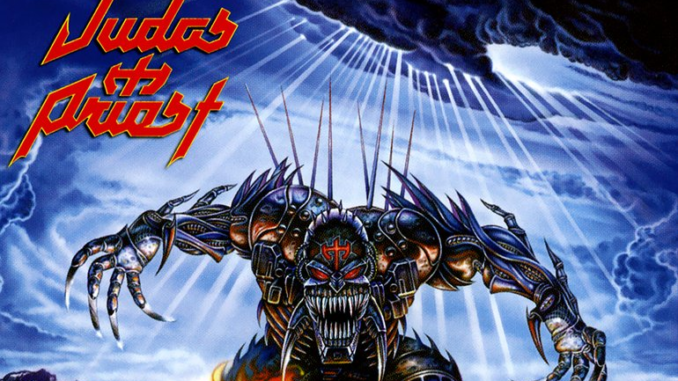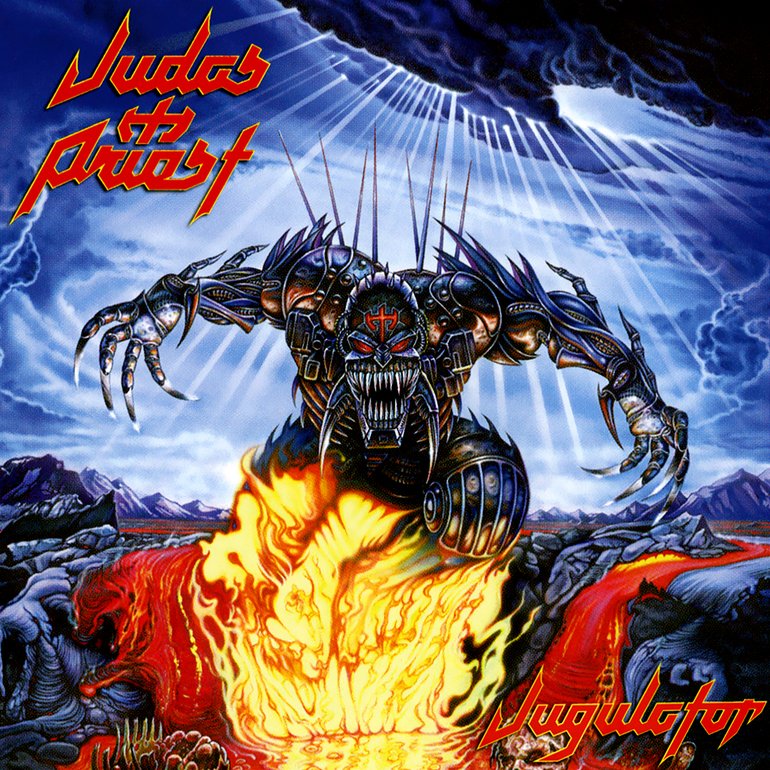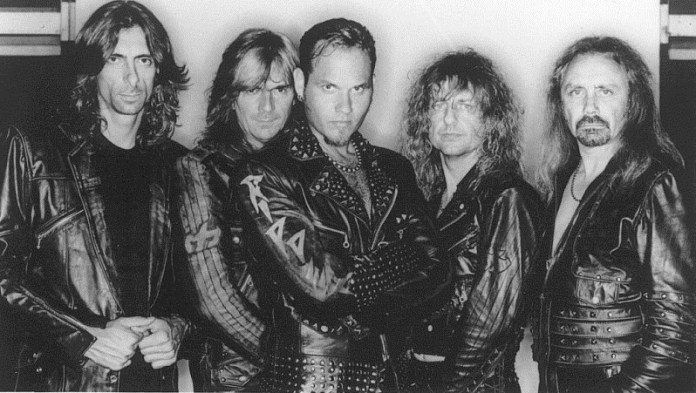
SUMMARY
- Album Art: 3/5
- Musicianship: 9/10
- Vocal Quality: 9.5/10
- Vocal Uniqueness: 9/10
- Song Consistency: 8/10
- Song Writing Quality: 8.5/10
- Lyrics: 5/10
- Heaviness/Grit: 9.5/10
- Production Quality: 8/10
- OVERALL SCORE: 8.2/10
Lineup:
Tim “Ripper” Owens – Vocals, K.K. Downing – Guitars, Glenn Tipton – Guitars, Ian Hill – Bass, Scott Travis – Drums
IN SHORT

In May of 1992, Rob Halford officially left JUDAS PRIEST, leading to several uncertain years for the band. It took four years to replace the legendary Halford and hire Tim Owens as the band’s new singer in 1996. Tim “Ripper” Owens had previously sung in a JUDAS PRIEST tribute band, whose talented voice and wide vocal range had impressed the remaining members of JUDAS PRIEST. Before the new lineup even released any music, however, fans of the band were divided. Many had hoped JUDAS PRIEST would reunite with Halford and flat-out refused to give the band a chance without him at the helm.
The unrest among fans was even further tested when JUDAS PRIEST released Jugulator in October 1997. The music style was a far departure from ‘classic’ JUDAS PRIEST. The lyrics dealt with harsher themes than previous albums and the guitars were tuned down as low as C# and C, which shifted the band towards a thrash metal-oriented sound. Most of the songs showcased slower, driving tempos and simple structures. In many ways, the album feels like an intentional move away from the old JUDAS PRIEST label. The new sound came as a surprise to most of the band’s core audience and fueled the fire of frustration. The change in style and direction challenged fan expectations. This, coupled with the mindset that no one could replace Rob Halford, meant many fans never gave Jugulator a chance.
Even critics could not help but compare Owens to Halford and the sound on Jugulator to previous outings. One critic stated that Owens lacked “the upper octave range that made Halford’s voice distinctive” and that the band’s music had “become derivative where once it was innovative”. I believe both statements are unfounded and showcase the biased opinions at the time. Today, most of the metal community considers Owens to be a legendary singer in his own right, and is known for his upper octave range. This goes directly against the contemporary critiques. In 1997, fans and critics alike seemed unable to see Jugulator for what it was: a really good heavy metal album led by an up-and-coming vocalist. Instead, they were unable to get past the JUDAS PRIEST label. All they thought was “this doesn’t sound like the same JUDAS PRIEST, I hate this”.
Looking back at Jugulator with fresh eyes, more than 20 years after its release, I have come to a few conclusions. First, if the album had been released under a different band name, Jugulator could be in the conversation of classic pure metal albums. It is certainly not the greatest album of all time, but there are no bad tracks and it gets better each time you listen to it. The album isn’t overly complicated (in terms of the music and lyrics) which makes it an ideal candidate to clear your mind and headbang. It’s also important to remember when JUDAS PRIEST released Jugulator with Owens, they didn’t replace a metal god, they created a new one.

IN DEPTH
The opening seconds of “Jugulator” make it immediately apparent that JUDAS PRIEST is trying to separate themselves from the band’s prior era. There is almost an industrial/nu metal vibe to the intro. When the distorted guitar first kicks into the right headphone, it sounds deep, mean, and “chunky” (for lack of better word). In short, within 30 seconds, any preconceived notions of JUDAS PRIEST’s sound should go out the window. The lyrical themes are also grittier than traditional JUDAS PRIEST – the lyrics in “Jugulator” act as a more gruesome version of “Painkiller”. However, the lyrics are more juvenile and don’t quite balance the campy-ness of Rob Halford’s lyric writing (a weakness apparent throughout the album).
Interestingly, the first taste we get of Tim “Ripper” Owens’ vocals is a low, growling voice – also very different for the band. At the 1:45 mark, we do get the first example of Ripper’s upper octave but spends most of the track in the lower register. The final mix also puts too many effects on his voice, so it becomes difficult to truly gauge his vocals on the opening track. Ultimately, “Jugulator” is probably my least favorite song on the album. It feels like the band is trying to shake off the rust after a 7-year absence from the studio.
“Blood Stained”, on the other hand, is an instant classic JP song. It’s unfortunate that this track has not been performed live since the band’s reunion with Rob Halford. The track is really simplicity at its finest. The verse is primarily three notes, the chorus is two notes. The variety in the song comes from the changes in rhythm and tempos and Ripper’s vocal work. This track is a much better representation of Ripper as a vocalist than the opener. The guitars continue to be down-tuned, and the lyrics continue to be harsh. The production is also harsher than any previous JUDAS PRIEST record and gives it an angry feel to match the lyrics. Despite the dark themes and energy, the chorus still manages to be very catchy and memorable. If the band was shaking the off the rust with the title track, they managed to create a diamond with “Blood Stained”.
Where “Blood Stained” sounded angry, “Dead Meat” sounds mean. From the vicious, growling dog at the start, to the double-bass driven verse. The track features another very simple structure, common throughout the entire album. “Dead Meat” allows the music to take a back seat and really Ripper’s vocals to stand out. Ripper shows a lot of charisma on this track as he changes vocal emphasis frequently, leaving each verse and chorus as a unique section of music. In all, the track is a great showcase for Tim “Ripper” Owens and an overall solid song.
“Death Row” opens with a long, theatrical intro, continuing the album’s trend of doing things very un-JUDAS PRIEST like. The intro is more reminiscent of something KING DIAMOND would do. However, once the song kicks in, it is a up-tempo, simply constructed, catchy track. “Death Row” has a sense of enthusiasm to it from start to finish and is one of the heaviest songs on JUDAS PRIEST’s heaviest album. The chorus is memorable and the riffs pack a punch. Perhaps it is due to the lackluster lyrics, but this is one of the band’s most underrated tracks.
The fifth track, “Decapitate” is the first on the album to feel repetitive. It continues the same song structure and death themes as the first four tracks but isn’t as well-developed. The track has some good moments but is the most forgettable track on Jugulator.
The back-half of the album begins with “Burn in Hell”, one of two singles from Jugulator. This song should be a classic JUDAS PRIEST track. It is the quintessential slow burn (pun intended). “Burn in Hell” opens with a long, slow intro that heavily features Ian Hill’s booming bass and builds in power, leading to one of the greatest screams in metal history – at the 2:44 mark of the studio track. Portions of this track remind me of another JP track, “Night Crawler”, with Downing and Tipton’s guitars being used to create sound effects to add depth to the lyrics.
Once “Burn in Hell” hits its boiling point, the track maintains it’s energy until the closing seconds. The chorus is iconic, or should be at least, as it is a perfect combination of dark and heavy, and utilizes Ripper’s amazing upper-octave vocals. Ultimately, “Burn in Hell” is a song with lots of charm and substance. It’s something you feel in your gut, even if it’s difficult to explain.
“Brain Dead” continues Jugulator‘s death theme and simple song structure. The chorus is catchy and the track is more enjoyable with each listen. It also features crisp performances from each band member. However, like “Decapitate”, the track is more forgettable than most of the other’s.
The album wraps up with a trio of songs that became some of my childhood favorites. Beginning with “Abductors”, 10-year old me thought there was nothing better than pure heavy metal combined with alien stories. “Abductors” is a slow, driving, headbanger of a track. As with much of the album, it is not a complex arrangement but is instead punctuated by raw and heavy guitars. There is even a little word play in the lyrics – “they strap you in-struments laid before you” – to complete the all-around fun of this track.
The ninth track on the album, “Bullet Train”, was nominated for a Grammy for Best Metal Performance in 1998. It is more up-tempo than the rest of the album and fits more neatly into the classic JUDAS PRIEST sound. This may be why folks who disliked Jugulator (and the entire Ripper-era of the band) still agree that “Bullet Train” is a good song. It is the equivalent to classic JUDAS PRIEST with a heavier guitar tone.
Finally, we get to the last track on the album. “Cathedral Spires” is the epic, end of the world, masterpiece clocking in at over 9 minutes. This song is regularly pointed out as the best thing to come out of the Tim “Ripper” Owens era and is arguably a top-5 best JP song ever. The track takes it’s time, opening with a long ballad-like intro and is probably the best performance Ripper has ever recorded. The track is full of emotion, passion and an amazing mix of melody and brute-force. Like the rest of the album, “Cathedral Spires” was mostly dismissed when the album released but is a song everyone should experience.
CONCLUSION
JUDAS PRIEST’s Jugulator is a good album with iconic moments peppered throughout. It faced a lot of bias when it was released and has lived under-the radar ever since. Portions of the album are a masterclass in pure, straight-forward metal but this fact was ignored because it didn’t fit the JUDAS PRIEST mold. Sure, the lyrics are lacking in depth and the songs rely on simplistic structure. However, looking back more than twenty years after its release, I can confidently say this album deserved better and metal fans everywhere should give this another chance – you won’t be disappointed!
HIGHLIGHTS:
“Blood Stained” , “Burn in Hell”, “Abductors” , “Cathedral Spires”
